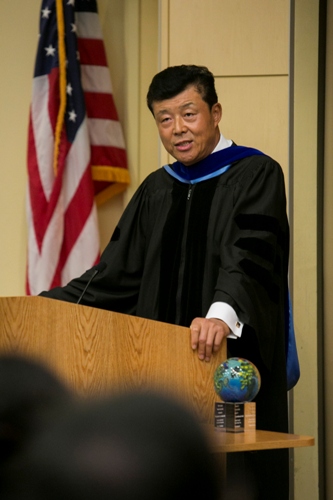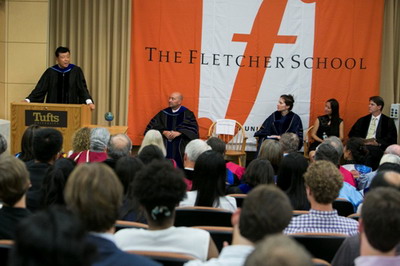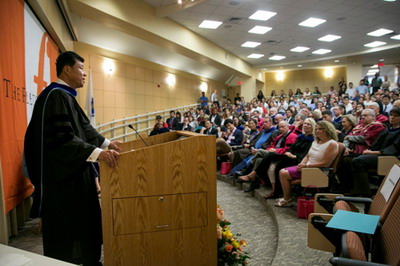|

Dean Stavridis,
Faculty and Students of Fletcher,
Ladies and Gentlemen,
It's a great pleasure to come back to Fletcher, my Alma Mater in the States after over 30 years.
Better still, it has been a great blessing to apply what I learned here at Fletcher to my life's work in diplomacy.
A full 40 years have passed since I joined the Chinese foreign service in 1974. I have since served overseas six times on four continents, in Africa, North America, Asia and Europe. More than half of those years have been dedicated to China-US relations.
So, I had two things in mind when I heard from Dean Stavridis, about the decision to accord to me the most prestigious honour of the Fletcher Class of 1947 Memorial Award and the invitation to deliver the Keynote Address at this Convocation.
The first was of course immense appreciation for the great honour.
The second was a theme for this Address. With all these years behind me, how to best present my take on diplomacy to such an informed audience at this Convocation today?
After some thought it became clear to myself that a mere account of "been there, done that" would not do the job.
Instead, I have decided to focus on my four missions as a career diplomat, namely:
Peace,
Development,
Cooperation,
And 'win-win'.
These are my lifetime pursuit and the pursuit of my fellow Chinese diplomats. These are also consistent commitments of China's foreign policy. In addition they are the inherent elements of the 'China Dream' which I will come to later.
Moreover, I believe, those four pursuits match the founding purposes of the Memorial Award, and are in line with the Fletcher commitment that is,
"to offer a broad professional education in international relations to students committed to maintaining the stability and prosperity of a complex, challenging and increasingly global society."
I studied only one year at Fletcher, but that was such a rewarding experience. I was fortunate to have such inspiring teachers as Professor Alan K. Henrikson and Professor Robert L. Pfaltzgraff Jr. I owe them a deep debt of gratitude. I am delighted they continue to guide and influence new generations of diplomats.
Over the decades, I have crossed paths with Fletcher alumni on many occasions, either across the negotiation table or side by side in the diplomatic corps.
I have found that our shared Fletcher heritage makes it easier to communicate - most of the times! There are occasions when it gets intense.
In 1995 I was the Deputy Director General for North American and Oceanian Affairs in the Chinese Foreign Ministry. In that role I travelled to New York with Vice Foreign Minister Li Zhaoxing for political consultations with US Under Secretary of State Peter Tarnoff. The topic of the day was a proposed state visit to the US by Chinese President Jiang Zemin.
China-US relations at the time were just recovering from a rough patch. Also, it had been 10 years since the previous state visit by a Chinese President to the US. But, at the meeting, our American colleagues were of the opinion that "it was not time yet" for a state visit. Instead they suggested an official working visit.
The discussion was going no-where. Then the number two in the American delegation volunteered to speak. This was Assistant Secretary Winston Lord. As you may know he is a F60 and a fellow Memorial Award recipient. Also, he once served as the American Ambassador in Beijing.
Winston Lord began to speak and offered five reasons why an official working visit served both sides best.
Vice Minister Li passed me a slip, on which he wrote:
"Your fellow alumnus has spoken. What say you?"
I took up the challenge and listed seven reasons why a state visit was the only viable option.
Just Winston Lord was about to dive into his rebuttal, he was stopped by Peter Tarnoff, who turned to Vice Minister Li saying that,
"Our Number Two's are both graduates of Fletcher and Fletcher is good at producing debaters. If we let Fletcher guys have their ways we will never see the end of it!"
That debate of Fletcher vs Fletcher, F60 versus F83 did not bring the two sides to a consensus. But, it did help both sides understand each other better. Two years later President Jiang Zemin paid a successful state visit to the States, and I had the honor to be in his entourage.
My engagements with Fletcher alumni were not always so competitive.

In September 2001, I presented my credentials to President Mubarak of Egypt on the same occasion with Ambassador David Welsh, F77. During our days in Egypt, we compared notes quite often on issues of mutual interest.
In 2006 I was appointed the Chinese Ambassador to the DPRK. It was one of the last places where I would have expected interactions with Fletcher community. But I was wrong.
First, I had a F71 guest, Governor Bill Richardson of New Mexico. He led a bi-partisan delegation to the DPRK and asked to see me first thing he arrived. At the reception in his honor Governor Richardson opened his remarks by saying:
"Ambassador Liu and I went to the same school, that is, the Fletcher School of Law and Diplomacy".
Then in 2009, our Dean Emeritus, Ambassador Stephen W. Bosworth, was appointed the US Special Representative for North Korean Policy by President Obama. We had in-depth discussions on the DPRK on a number of occasions and made joint efforts to advance the six-party talks on the Korean Nuclear Issue.
I recall these events not to show that Fletcher taught me debating or broadened my connections, but to emphasise the importance of my year at Fletcher that has contributed to my career to this very day.
Although Fletcher alumni come from and represent many different countries, I find a common bond between us all, which is the core value embodied in Fletcher that ultimately we are all working for the greater good for all humanity.
Recently, I was asked what strikes me most in my 40 years of diplomatic service. My answer is that diplomacy is never an individual performance, but is much better compared to a national orchestra.
Success in diplomacy, or in a diplomatic career, cannot be separated from the prosperity and strength of the country you represent.
I feel all the more strongly about this as I reflect on the history as the Chinese Ambassador to the UK.
My embassy started as the legation of the Qing Dynasty in London in 1877. It was China's first resident mission overseas in the modern sense, but the story of this origin is hardly something to be proud of.
In 1875, a British expedition crossed into China's Yunnan Province from Myanmar. A certain Augustus Raymond Margary, the interpreter dispatched by the British legation in China, was killed in clashes with local people.
The British Government reacted by forcing upon the Qing government the Chefoo Convention, which extorted a hefty indemnity and forced open more trading ports. But worst of all an apology was demanded from the Chinese Emperor via his special envoy to Queen Victoria in person.
So, there went my first predecessor Guo Songtao to the UK in 1877. To make his mandate look less apologetic, the Qing government decided to make him stay as the Chinese Minister in London after his apology mission was accomplished.
The rest is the humiliating history. The first resident envoy China sent to a foreign country had a mandate of apology. The first letter he presented to his hosting Head of State was not one of credentials but one of apology.
This year is the centenary of the outbreak of the First World War. That reminds me of another predecessor in London V. K. Wellington Koo, Minister and later Ambassador to the United Kingdom. He was a member of the Chinese delegation when China joined the Paris Peace Conference as a victor in 1919. But to his disappointment, China's sovereignty and legitimate interests were left to the mercy of Western Powers at the Conference. Mr. Koo protested but was ignored. He refused to sign the Treaty of Versailles at the end of the day, but that "gesture" could not alter a bitter result.
Those episodes of history taught us Chinese a lesson the hard way. That is a weak nation does not have diplomacy. For too long a time in modern Chinese history this created deep hurting wounds for the Chinese people, especially Chinese diplomats. That is why sovereignty and territorial integrity are always at the heart of China's foreign policy.

Now China is rising in the world. The Chinese people are standing tall and making efforts towards the 'China Dream', the Dream which features national and individual prosperity and the great rejuvenation of the Chinese nation.
We have put forward two centenary goals for the 'China Dream':
· By the end of this decade, which marks the centenary of the Communist Party of China, China will build a moderately prosperous country.
· And by mid-century when we celebrate the centenary of the People's Republic, China will become a developed nation.
According to President Xi Jinping, the Chinese people will enjoy:
· The opportunity to a prosperous life.
· The realization of their ambitions and dreams.
There are some observers who have expressed worries about the 'China Dream'. Some suggest it means China will seek to avenge past wrongs. Others proclaim that China will eventually seek regional and even global hegemony. Such opinions are an anachronism and a complete misreading of China.
The 'China Dream' has peaceful development and win-win cooperation at its very core.
The commitment to peace and development is a strategic choice based on our own past and present, and our judgment on the call of the times.
Loving peace is built into our culture. China is the only permanent member of the UN Security Council:
· That has no history of colonization.
· That has no overseas military bases or stationed troops.
· China alone is committed not to using nuclear weapons first, nor to using them against non-nuclear countries and regions.
Peaceful development is anchored in sound logic. In a country of China's size, national rejuvenation and individual prosperity for 1/5 of humanity cannot be built on expansion and exploitation. It calls for undiverted attention to development which is only viable in peaceful times.
Peaceful development is our conclusion from lessons learned from history. China has seen too many powers coming and going, rising and falling, each as swift as the other. We know domination is not the way, and hegemons do fall.
China has far too much experience of being on the receiving end of colonialism and invasions. China understands, and all too clearly, the ancient teaching of:
"Do not do unto others what you don't want others to do unto you."
What China has accomplished in the last three decades, and more, makes us all the more confident about achieving national prosperity through peaceful development.
To make our dream come true, we opt for win-win cooperation.
As early as 2500 years ago, Confucius espoused the idea of:
"Helping others in order to help oneself".
This philosophy is in our 'DNA' and is our desired pathway to the 'China Dream.' China will never aim to dominate others but will seek to build a better future for others and ourselves.
To that end, China values cooperation in promoting development, solving disputes and expanding opportunities and common interests. We have reason to believe that our own development and the prosperity of the world are mutually beneficial.
According to the IMF, China accounts for a quarter of world economic growth since the outbreak of the international financial crisis. It is projected that in the coming five years, China will procure up to 10 trillion dollars worth of goods and invest over 500 billion dollars overseas. This means enormous opportunities for other countries in the world.
China's contribution to the world is not limited to economics. It has made huge contributions to international efforts in tackling environmental challenges. China is the world's largest investor in clean energy. It also leads all other countries in the development of solar energy. China's exports of solar products account for over half of the world's total.
British Prime Minister David Cameron once commented:
"China's transformation is one of the defining facts of our lifetime".
He went on to say:
"I see China's rise as an opportunity, not just for the people of this country but for Britain and the world."

We in China know too well that the voyage to that bright future is never going to be easy sailing. Hardships and challenges are guaranteed.
A most discussed issue is the so-called 'Thucydides Paradox', which suggests that emerging powers and established powers are doomed to clash.
In this context, there is much reflection about the First World War that broke out 100 years ago. Then there is the enduring task of dealing with the legacy of the Second World War that ended almost 70 years ago. Both these wars had immense influence on the founding purposes of the Fletcher Class of 1947 Memorial Award. With this hindsight we should all the more renew our faith in peace and cooperation as the call of the times.
The spirit of Fletcher should be a constant guide about the wisdom of mankind, and skills of diplomats in particular, to find a way around the follies of the past. We have reason to believe that the 'China Dream' and the 'American Dream' are not destined to collide, but are fully capable of interacting and working to each other's enhancement.
To this end, President Xi Jinping advocates the development of a new type of relationship between major powers that features:
· 'no conflict,
· no confrontation,
· mutual respect,
· and win-win cooperation'.
For this diplomatic innovation to work, we need China and the United States to work together. This will take optimal wisdom, courage, confidence and a pinch of diplomatic art.
Together, we can make the vast Pacific Ocean the joiner of our two great nations, so that it truly lives up to its name.
Before I wrap up, I wish to quote from President John F. Kennedy, one of Massachusetts' favourite sons:
"But peace does not rest in the charters and covenants alone. It lies in the hearts and minds of all people. So let us not rest all our hopes on parchment and on paper, let us strive to build peace, a desire for peace, a willingness to work for peace in the hearts and minds of all of our people. I believe that we can. I believe the problems of human destiny are not beyond the reach of human beings."
With these words of Kennedy in mind, I hope our future diplomats here have the courage to reject any fallacy that we are doomed to repeat the past, and have the wisdom to command and shape the destinies of our nations.
Whatever you do and wherever you go, I urge you to strive for peace, to work for development, to build cooperation and to achieve win-win.
Through your life you will do humanity a great service if you live up to the ideal of Fletcher at its best.
Together we can make our world a better and safer place.
Fletcher encourages us to aim high.
So let us aspire to create a record of success in history. When future generations talk about your time, they will see examples to follow, not follies to avoid.
To a career diplomat, there is perhaps no mission more noble and no dream more desirable.
Thank you.
|

